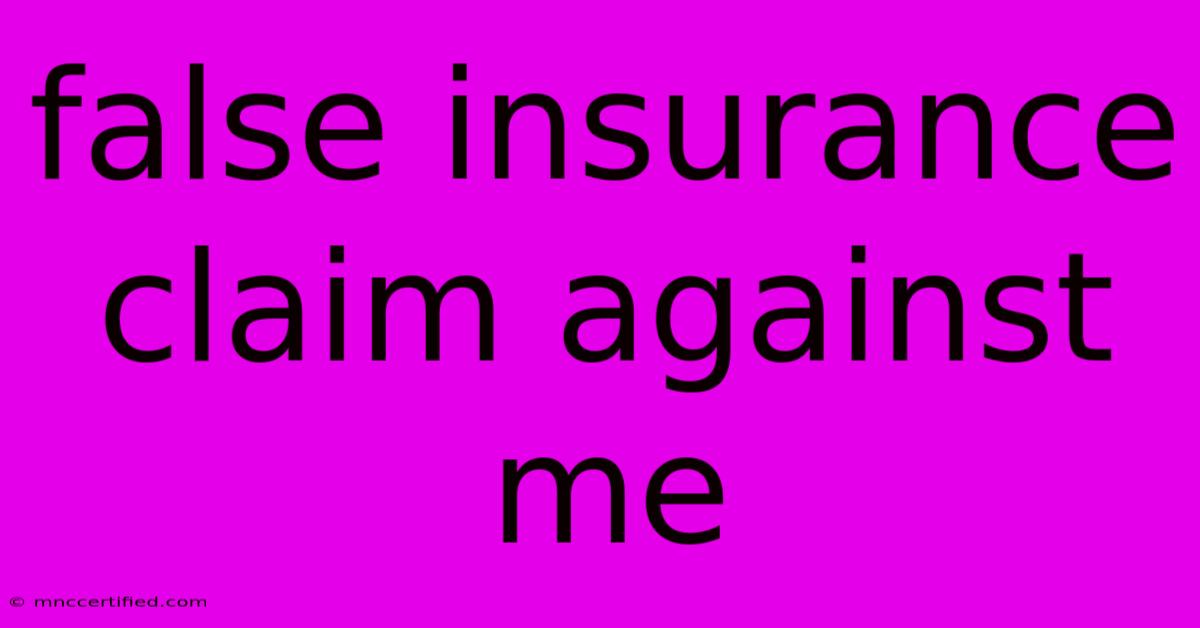False Insurance Claim Against Me

Table of Contents
False Insurance Claim Against You: What to Do
Being accused of making a false insurance claim is a serious matter with potentially devastating consequences. It can impact your finances, your reputation, and even lead to legal repercussions. This comprehensive guide explains what to do if someone makes a false claim against you, providing actionable steps to protect yourself.
Understanding the Gravity of a False Claim
A false insurance claim is a fraudulent act, alleging damage or loss that didn't occur or exaggerating the extent of legitimate damage. Insurance companies take these allegations very seriously, investigating thoroughly to protect their interests and prevent fraud. False accusations can result in:
- Financial penalties: Increased premiums, policy cancellation, and even legal fees.
- Legal repercussions: Lawsuits, fines, and even criminal charges depending on the severity and jurisdiction.
- Damage to reputation: A false claim accusation can significantly tarnish your personal or professional reputation.
Steps to Take When Faced with a False Insurance Claim
If you're accused of making a false insurance claim, immediate and decisive action is crucial. Follow these steps:
1. Review the Claim Documentation Carefully
Understand the specifics of the accusation. What exactly are you being accused of? Note the dates, amounts, and any supporting evidence provided.
2. Gather Your Evidence
Collect any documentation that contradicts the claim. This could include:
- Photos and videos: Document the actual condition of your property or vehicle.
- Repair bills and invoices: Show legitimate expenses if any repairs were needed.
- Witness statements: If anyone can corroborate your version of events, get their statements in writing.
- Communication records: Emails, texts, or letters relevant to the claim.
- Policy documents: Review your insurance policy to understand your coverage and obligations.
3. Contact Your Insurance Company Immediately
Report the false claim to your insurer promptly. Provide them with all the evidence you've gathered. Your cooperation is key; a swift and transparent response demonstrates your good faith.
4. Consult with a Legal Professional
Seek advice from a lawyer specializing in insurance law. They can guide you through the legal process, advise on your rights, and represent your interests. This is crucial, especially if the claim involves significant amounts or potential legal action.
5. Maintain Detailed Records
Keep meticulous records of all communication, documentation, and actions taken throughout the process. This includes dates, times, and the names of individuals involved. This record-keeping is essential for your defense.
6. Avoid Confrontation
While you want to clear your name, avoid directly confronting the person making the false claim. This can escalate the situation and potentially harm your case. Let your lawyer and insurance company handle the communication.
Preventing False Claims Against You
Proactive measures can minimize the risk of false claims. Consider these preventative steps:
- Maintain thorough documentation: Keep records of all valuable assets, including photos, appraisals, and purchase receipts.
- Secure your property: Implement security measures to deter theft or damage.
- Understand your insurance policy: Familiarize yourself with the terms, conditions, and claims process.
- Communicate clearly: Maintain clear and documented communication with your insurance company.
Keywords for SEO Optimization:
- False insurance claim
- False claim against me
- Disputed insurance claim
- Fraudulent insurance claim
- Insurance claim investigation
- How to handle a false insurance claim
- What to do if someone makes a false claim against you
- Insurance claim defense
- Protecting yourself from false insurance claims
- Legal advice for insurance claims
This article provides a comprehensive overview. Remember, the specifics of dealing with a false insurance claim will depend on your individual circumstances and local laws. Always seek professional legal counsel for personalized guidance.

Thank you for visiting our website wich cover about False Insurance Claim Against Me. We hope the information provided has been useful to you. Feel free to contact us if you have any questions or need further assistance. See you next time and dont miss to bookmark.
Featured Posts
-
Captain Toms Legacy Daughters Involvement
Nov 22, 2024
-
Lp Thompson Insurance Hammond Ny
Nov 22, 2024
-
Week 13 Bengals Lb Predicts Steelers Win
Nov 22, 2024
-
Andys Role In Alien Romulus
Nov 22, 2024
-
Monday Night Football Channel Browns Game
Nov 22, 2024